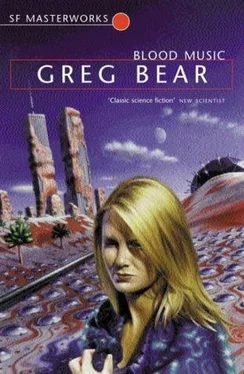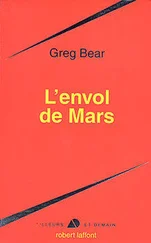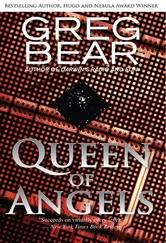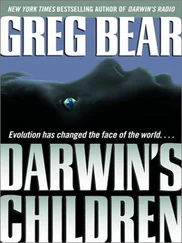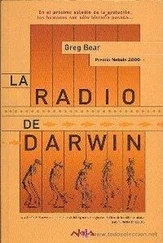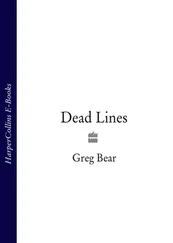“Dr. Gogarty.”
“Professor, that is, just Sean, please. I like to eschew titles.”
“Then I am Michael.” Am I ?
“Yes, well in your case… er… it’ll be a bit harder to stick to that. I know of you, and I’m sure you’ve never heard of me, er, Michael.” Again the smile, but without certainty, troubled. As if, Bernard thought, he expected a human being and met
“Paul has briefed me on some of your work. You’re a bit beyond me, Sean.”
“Indeed. This thing, this incident in your country is as much beyond me, I’m certain. I have a few things I would like to talk out with you, Michael, and not just you.”
Paulsen-Fuchs looked at Gogarty with some apprehension. No doubt this meeting was sanctioned by several governments, Bernard thought, or it never would have happened, but Paul was still on edge.
“My colleagues, then,” Bernard gestured at Paulsen-Fuchs.
“Not your human colleagues, no,” Gogarty said.
“My noocytes.”
“Noocytes? Yes, yes, I understand. Your noocytes. Tielhard de Chardin would have approved of that name, I think.”
“I haven’t been thinking much about Tielhard de Chardin lately,” Bernard said, “but he might not be a bad guide.”
“Yes, well, I’m here just barely, by the scruff of the neck,” Gogarty said, “and my time has been limited. I have a notion to propose to you, and I would like you and your small colleagues to pass judgment on it.”
“How did you get detailed information about me, about the noocytes?” Bernard asked.
“Experts all over Europe are being approached. Someone came to me on a hunch. I hope it doesn’t affect his promotion. I’m not highly respected by all my fellows, Dr. Bernard-Michael. My ideas are more than a touch far-out”
“Let’s hear them,” Bernard said, growing impatient.
“Yes. I assume you haven’t heard much about Information Mechanics?”
“Not a whisper,” Bernard said.
“I’m working in a very specialized area of that branch of physics—an area not yet recognized—the effects of information processing on space-time. I’ll put it simply enough, because the noocytes may already know more than I and be better able to explain it to you—”
“Don’t count on it. They relish complexity, and I don’t” Gogarty paused and sat absolutely still for several seconds. Paulsen-Fuchs glanced at him with fleeting anxiety.
“Michael, I have amassed a great deal of theoretical structure which supports the following assertion.” Deep breath. “Information processing—more strictly, observation—has an effect on events occurring within space-time. Conscious beings play an integral role in the universe; we fix its boundaries, to a great extent determine its nature, just as it determines our nature. I have reason to believe- just an hypothesis so far—that we don’t so much discover physical laws as collaborate on them. Our theories are tested against past observations both by ourselves—and by the universe. If the universe agrees that past events are not contradicted by a theory, the theory becomes a template. The universe goes along with it. The better the theory fits the facts, the longer it lasts-if it lasts at all. We then break the universe down into territories or particular territory, as human beings, beings thus far quite distinct No extraterrestrial contact, you know. If there are other intelligent beings beyond the Earth, they would occupy yet other territories of theory. We wouldn’t expect major differences between the theories of different territories—the universe does, after all, play a major role—but minor differences might be expected.
“The theories can’t be effective forever. The universe is always changing; we can imagine regions of reality evolving until new theories are necessary. Thus far, the human race hasn’t generated nearly the density or amount of information processing—computing, thinking, what have you—to manifest any truly obvious effects on space-time. We haven’t created theories so complete that they pin down reality’s evolution. But that has all changed, and quite recently.”
Listen closely to the GOGARTY.
Bernard perked up and began to pay more attention.
“If I only had time to present my mathematics, my correlations with formal information mechanics and quantum electrodynamics…and if only you could understand!”
“I’m listening. We’re listening, Sean.”
Gogarty’s eyes widened. “The…noocytes? Have they responded?”
“You haven’t given them much to respond to. Do go on, Professor.”
“Until now, the densest single unit of information processing on this planet was the human brain…slight nod to cetaceans, perhaps, but not nearly as much stimulus and processing going on, much more insular I’d say. Four, five billion of us, thinking every day. Small effects. Time stresses, little tremors as it were, not even measurable. Our powers of observation—our power to formulate effective theories—is not sufficiently intense to bring about the effects I’ve discovered in my work. Nothing in the solar system, perhaps not even the galaxy!”
“You are rambling, Professor Gogarty,” Paulsen-Fuchs said. Gogarty gave him an irritated nod and fastened his eyes on Bernard’s, pleading with him.
He speaks of interest.
“He’s getting to the point, Paul, don’t rush him.”
“Thank you. Thank you very much, Michael. What I am saying is that we now have conditions sufficient to cause the effects I’ve described in my papers. Not just four, five billion individual cogitators, Michael, but trillions…perhaps billions of trillions. Most in North America. Tiny, very dense, focusing their attention on all aspects of their surroundings, from the very very small to the very large. Observing everything in their environment and theorizing about the things they do not observe. Observers and theorizers can fix the shape of events, of reality, in quite significant ways. There is nothing, Michael, but information. All particles, all energy, even space and time itself, are ultimately nothing but information. The very nature, the timbre of the universe can be altered, Michael, right now. By the noocytes.”
“Yes,” Bernard said. “Still listening.”
Something not stated…evidence…
Two days ago,” Gogarty said, becoming more animated, his face reddening with excitement, “the USSR apparently launched a full-scale nuclear strike on North America. Unlike the Panama strike, not one of the warheads went off.”
Bernard looked at Paulsen-Fuchs first with pique, then amusement He hadn’t been told a thing about this.
The USSR is not that bad at building warheads, Michael. There should have been holocaust. There wasn’t Now, I have compiled several striking graphs from observations and information. One very important source was an American reconnaissance aircraft carrying scientists and reporters over North America, with a live broadcast going to Europe by satellite. The aircraft was in the middle of the United States when the strike was attempted. The plane apparently went down, but not because of the strike itself. Nobody is sure why it crashed, but the way its telemetry and communications were cut off…The timing, the queuing, fits my theory precisely. Not only that but in places around the globe, very peculiar effects were felt Radio silences, power cut-offs, meteorological phenomena. All the way out to geosynchronous orbit-two satellites separated by twelve thousand kilometers malfunctioned. I put the effects and coordinates of the incidents into our computer and it produced this profile of the four-space field.” He lifted a blown-up photo of a computer image from his satchel.
Bernard squinted to see it more dearly. His vision suddenly sharpened. He could make out the grain of the photo paper. “Like a weightlifter’s nightmare,” he said.
Читать дальше
